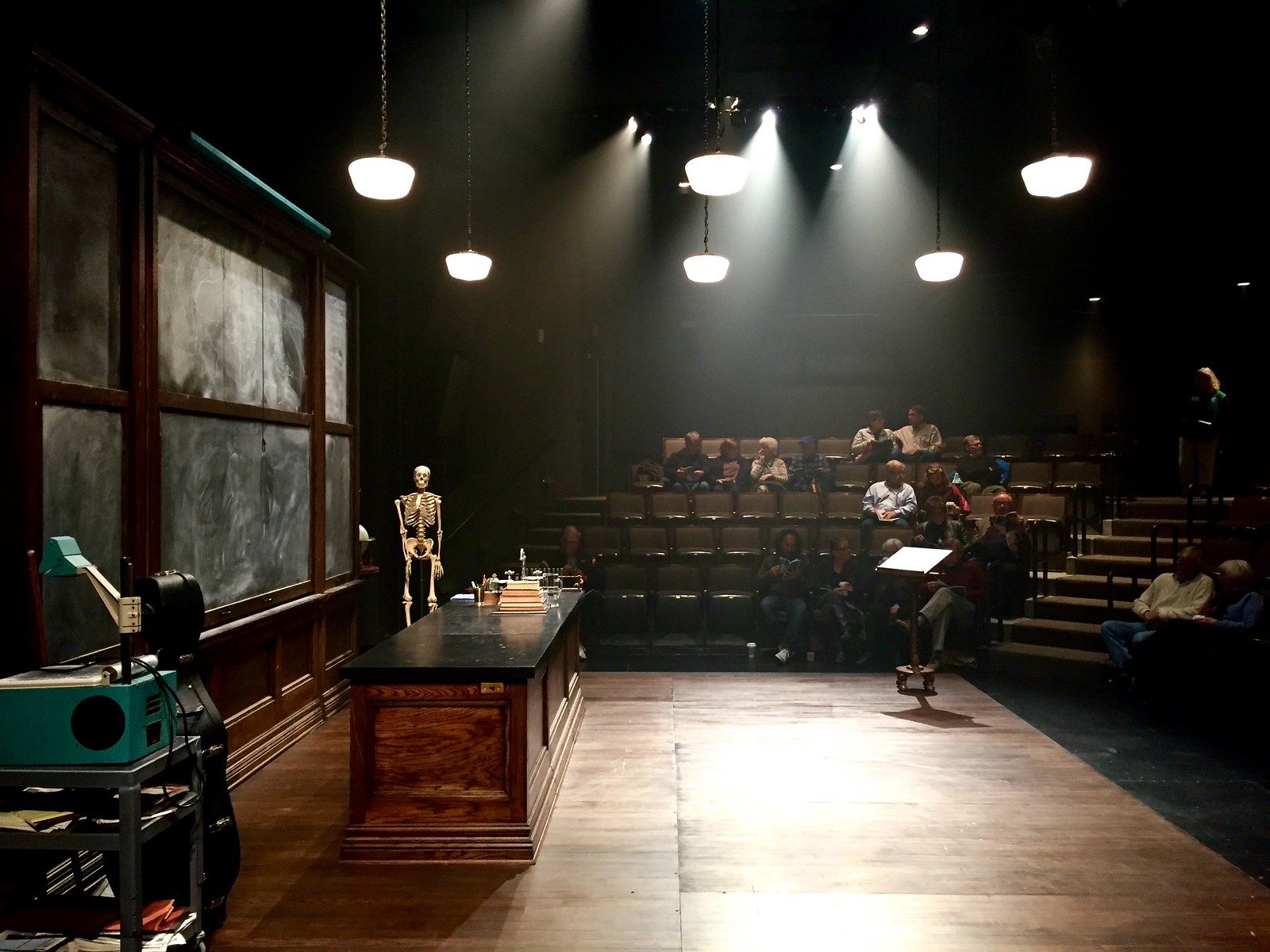
... you might consider taking a much more dramatic approach to covering that text...
ADDED: This is the set of the play we saw last night, "An Iliad." Here's the text of the play, which I just bought for myself, because I want to go over it again. As for this wonderful production, which some of the commenters on this post have seen and are talking about, here's the description at the American Players Theater website:
This is a story you may think you know; a grand classic born on the backs of gods and warriors. But... Homer’s epic is razed and reborn through the heart of a war-weary poet (Jim DeVita, at his best both in this place and in this role). Bathed in bravery, blood and the heat of battle, the telling ravages our Poet every time. But there’s a reason he’s got the job. He may be able to make us understand. Maybe make us stop. History’s greatest battle whetted to a razor-sharp edge in a stunning night of theater....The actor's sheer endurance was impressive, and there was no loss of energy at any point. Using the smallness of the classroom — and its tiny props — to represent the arena of the Trojan War by some miracle created the sense that this war was all wars and one death (Hector's) was all deaths. Little things became big. A postcard burnt with a lighter became the burning of Alexandria. (I had to restrain myself from shouting "Fire!" — truthfully — in a crowded theater.) I am, you may know, drawn to the mysteries of relative size — here's my "big and small" tag — and I cannot, after 64 years of life, really get my mind around largeness. So it was extremely significant to me to see the large things explained in tininess, such as sand poured on a small tabletop to represent the final encounter between Hector and Achilles, played out in wiggling fingers.
Run time: 1 hour and 50 minutes. An Iliad will be performed without an intermission.




15 comments:
I learned a lot of mathematics in lecture halls that looked like that. No skeletons over in the corner, though. This must be a biology lecture hall.
This is the set for the play "An Iliad" at the American Players Theater. The one character walks into the classroom to tell us, the audience/class, about "The Iliad." It was pretty great, and I was inspired as a real-life teacher to be more dramatic. Not as dramatic as this actor, but he showed how far, theoretically, a teacher could go in talking about the assigned text.
"An Iliad" was perhaps the finest production I've ever seen at APT.
I find myself "performing" for my students quite often. It is the only way to keep them awake and on task.
The Iliad at APT was transcendent.
The guy standing next to the chalk board votes Democrat.
Anyone in front of a classroom is performing. The only important question is the effectiveness of the performance.
@Althouse, one of my college professors made "Numerical Analysis of Differential Equations" interesting. Top that!
"The guy standing next to the chalk board votes Democrat."
Achilles?
"@Althouse, one of my college professors made "Numerical Analysis of Differential Equations" interesting. Top that!"
I just spent an hour and a half raving over of the indirect/direct distinction in the Commerce Clause cases.
Oh Gak! An overhead projector, the evil predecessor to...Powerpoint. Acetate overlays and magic markers. My broker probably invested in them. No wonder I lost in 2008.
And a lecture hall not lit like high noon, thus allowing students in the nosebleed section to safely snooze? Not where I went to school.
I just spent an hour and a half raving over of the indirect/direct distinction in the Commerce Clause cases.
Ah, but did your students find that to be interesting?
If you like the Iliad told in this way you would also enjoy "All Day Permanent Red" by Christopher Logue. Logue was a British poet who set about writing the Illiad in a modern voice. He could not read Greek but "translated" from some of the great translations. Extremely cool stuff.
I cannot, after 64 years of life, really get my mind around largeness. So it was extremely significant to me to see the large things explained in tininess, such as sand poured on a small tabletop to represent the final encounter between Hector and Achilles, played out in wiggling fingers.
Fuck Hector and Achilles. I've been to APT many times--the theater is outdoors, and it's nighttime. Look up.
"@Althouse, one of my college professors made "Numerical Analysis of Differential Equations" interesting. Top that!"
I just spent an hour and a half raving over of the indirect/direct distinction in the Commerce Clause cases.
While you're looking up, reflect that there are millions of intelligent civilizations up there. All of them appreciate the significance of differential equations. None of them give a shit about the Commerce Clause. That might help you get your mind around largeness.
Post a Comment
Please use the comments forum to respond to the post. Don't fight with each other. Be substantive... or interesting... or funny. Comments should go up immediately... unless you're commenting on a post older than 2 days. Then you have to wait for us to moderate you through. It's also possible to get shunted into spam by the machine. We try to keep an eye on that and release the miscaught good stuff. We do delete some comments, but not for viewpoint... for bad faith.